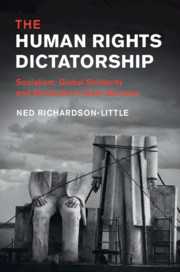‘In this pioneering book, Richardson-Little upends conventional wisdom that human rights are the natural enemy of authoritarian regimes. With great range and verve, he shows how the East German socialist state used human rights ideologically and diplomatically to stabilize and legitimate its fledging socialist republic, and only in the last decade of the regime did human rights emerge a source of dissent and resistance against the state. This is a model revisionist account of the protean and multi-directional nature of human rights under socialism.'
Paul Betts - University of Oxford
‘Finally a book on human rights history by someone deeply conversant with socialist thought, state-socialist regimes, and current human rights historiography. This is a rare and valuable book as well as a good read. It will be a reference point for years to come.'
Lora Wildenthal - Rice University, Texas
‘By showing the centrality of human rights to both the legitimacy and the downfall of the GDR, The Human Rights Dictatorship makes a major contribution to the global history of human rights. In this richly textured history, Ned Richardson-Little shows how East Germans instrumentalized human rights in the name of numerous shifting ideals: socialism, anti-fascism, anti-imperialism, Christianity, peace the environment, democracy, and ultimately, the creation of a unified German state.'
Celia Donert - University of Liverpool
‘Eagerly anticipated, Ned Richardson-Little's book breaks important new ground. Overcoming simple narratives of the GDR's erosion, he impressively uncovers the multiple meanings with which East German actors infused human rights - including state elites seeking to buttress their socialist project. Richly nuanced, the book advances our understanding of the twisted trajectory of human rights history in the 20th century.'
Jan Eckel - Eberhard Karls-Universität Tübingen
‘One of the hallmarks of a great book is that it exposes an area that would benefit from focused future research, laying the foundations for the creation of a complex structure of work on the subject. This book does exactly that. Though Richardson-Little tackles a large and incredibly complex topic in only 250 pages, he does so thoroughly and with a great balance between overarching concepts and definitions, and specific and vivid examples from his source base.’
Samantha Clarke
Source: H-Russia



